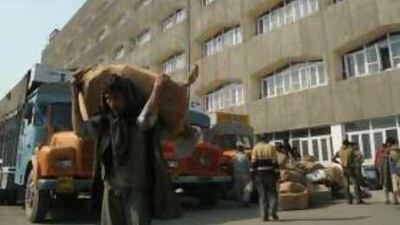SRINAGAR // Maimuna Malik and her husband have always looked forward to shifting to Jammu during the biannual "Darbar move", as the seasonal transition of government in Indian-administered Kashmir from the summer capital, Srinagar, to its winter capital and vice-versa is known. Mrs Malik said the move made her "feel cosy, for the shifting takes you away from the harsh winter that makes life dreary and expensive back home". Her husband, Zahoor Ahmed Malik, an accounts officer with the state's industries department, has been making these moves since he joined the government service 25 years ago. This year, in stark contrast to the past, the Maliks are more worried about moving to Jammu for the winter than dealing with the bad weather in Srinagar. "Frankly speaking, I do feel it in my bones? I don't know how the Jammuites will weigh up the Kashmiri Muslims being amidst them," Mr Malik said. The Maliks' concern is the result of a dispute over the transfer of about 40 hectares of forestland in the predominantly Muslim Kashmir valley. Tensions flared in June when the state government said it planned to transfer the land to the Shri Amarnathji Shrine Board to set up temporary shelters and facilities for the Hindu pilgrims who turn up in large numbers in summer at the cave shrine of Amarnath, nestled in the Himalayas. The move sparked off violent protests by Muslims, who said it was aimed at engineering a demographic change. Thirty-five people were killed as police opened fire on protesters. Ministers reneged on the plan, which in turn led to demonstrations in the mainly Hindu region of Jammu. There, three protesters were killed in clashes with the police. Some radical Hindu outfits, often referred to as saffron parties, used the situation to try to enforce an economic blockade on the valley, apparently to punish its population for opposing the land transfer. Although an agreement was reached between local groups and the government in August, tensions in the valley have continued to increase. The Kashmiris' boycott of goods coming from Jammu and their refusal to trade with Indian companies through brokers based in the winter capital in retaliation to the economic boycott have only exacerbated an already tense situation. "The ampersand seems to have gone out of Jammu-Kashmir," said Noor Ahmed Baba, an analyst and political science professor at the University of Kashmir. It is against this backdrop that the shifting is taking place this month. Jammu turns into the seat of government when Srinagar is freezing. Jammu and Kashmir, as the official name of the Himalayan state goes, is the only one in India where government offices of various departments, along with more than 8,000 employees and their families and records, move biannually. The shifting of the state secretariat has been going on since the time of Gulab Singh, the first Dogra maharaja who founded the state of Jammu and Kashmir during the British Raj in India in 1872. The Maliks are far from alone in being concerned about making the move to Jammu this year. "No doubt tensions persist and many people feel uneasy about it, but we have to go," said Nazir Ahmed Mir, the leader of a trade union of government employees at the civil secretariat. He said many of the officials would prefer rented private houses to the accommodation provided to them in select Jammu neighbourhoods by the estates department. Moreover, they are reluctant to go this time. Confirming this, a senior official of the state's general administration department, who wished not to be named, said: "In view of the fear-psychosis among some of the employees, we've requisitioned to accommodate them in a couple of private hotels in Jammu." Many in the valley criticise the government move for other reasons. It has devoured billions of dollars from the state treasury. But people in Jammu are against ending the practice. In the mid-1980s, a decision by the then chief minister Farooq Abdullah, a Kashmiri Muslim, to keep the government permanently in Srinagar brought Jammu to a boil. The move was seen by the people of the region as a deliberate attempt to sideline Jammu. "It has to remain there. The Darbar move can help towards strengthening the bonds between the valley and Jammu provided they are sincere towards one another," said Arun Joshi, a journalist and political analyst. "This time it would be a unique reconciliation as the people of Jammu - except some fringe elements, which are always there - do realise that without the valley and its people, Jammu is non-existent." As for the Maliks, Mrs Malik turned down the idea of her husband travelling alone to Jammu and calling her to relocate to the winter capital after assessing the situation. "I can't leave him alone. If something horrid does happen, let us face it together," she said while packing up in a tiny room of her Srinagar apartment. * The National

Muslims worry over capital shift
An outbreak of communal violence in Kashmir has made many government employees sceptical about the treatment they will receive in Jammu.
Most popular today
